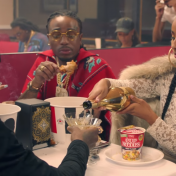The first topic I’d like to focus on is an issue that I feel was undercovered, or in some cases absent, from our early class lectures and readings, especially Michael Pollan’s book In Defense of Food. This issue is the unavailability of healthy food, and diverse choices for poor individuals and families, particularly in America. Pollen makes some references to… Read more »
Michael Pollan’s In Defense of Food tackles the issue at the heart of America’s health problems today: Nutritionism. Throughout the book, Pollan mentions how the science behind Nutritionism is flawed, saying that “Few scientists ever look back to see where they and their paradigms might have gone astray…” Later, Pollan explains how Gary Taubes “blew the whistle on the science… Read more »
What I found most interesting and thought provoking about this week’s lessons was the TED Talk video of Joel Salatin discussing about how he transformed his barren, wasteland of a farm into a paradise of abundance through the practice of regenerative farming solely using biological methods. By reintroducing organic matter into the soil, growing a variety of crops, and by… Read more »
Michael Pollen’s book In Defense of Food, and Nutritionalism at large, have always had a bit of affluent or bougie undertones but the end of this book amplified that undertone to an overtone. The book ends with a third act that is all about getting over Nutritionalism and eating better and thus a healthier life. The “Pay more, Eat Less”… Read more »
Michael Pollan states in his book In Defense of Food “Health is, among other things, the product of being in these sorts of relationships in a food chain…if the soil is sick or in some way deficient, so will be the grasses that grow in that soil and the cattle that eat the grasses and the people who drink the… Read more »
Images of genetically good looking people surrounded by (unhealthy) food that promises “fitness” is the epitome of how dysfunctional the Western diet is. I used to watch Fabio’s ‘I can’t believe it’s not butter!® ’ commercials all the time when I was little. No matter what channel I was watching, I could always expect an appearance from the hunky… Read more »
A notable point from the Michael Pollan reading was the emphasis on the origins of popular thought on nutrition throughout history; the shift from protein to carbohydrates as America’s über nutrient was noted as being catalyzed by John Harvey Kellogg, whose name coincidentally shows up in many home’s pantry to this day on cereal of all sorts (Pollan 30). This… Read more »
The American diet has shifted continuously throughout time, following and forming to fit within societal expectations and norms. For example, during World War II, meat was rationed and households commonly practiced “meatless Mondays” in efforts to support the cause. However, in more modern times, American diets have shifted to adapt trends than necessities. Specifically, in more modern times, the American… Read more »
Every day, whether it be in person or online, consumers are exposed to propaganda that affects their food choices. Alongside this, consumers are continually exposed to pieces of literature that judge certain eating habits, which have supposedly caused them to be more or less healthy. While this type of informal advice may be useful, there are certain flaws that have… Read more »
During Mattieu’s lecture, the tweet about Amazon really stood out to me. It made me think of the AmazonGO store, and then about how they donate their expiring foods to the homeless shelter where I work. Which lead me to take a look at the social implications of donating expiring food to those who cannot afford to buy it. Looking… Read more »

